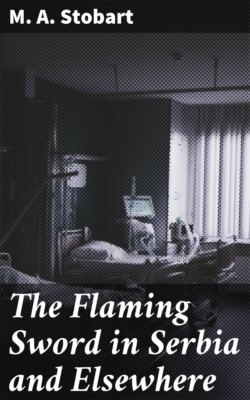Читать книгу The Flaming Sword in Serbia and Elsewhere - M. A. Stobart - Страница 15
На сайте Литреса книга снята с продажи.
CHAPTER X
ОглавлениеTable of Contents
That was the last typhoid tragedy within our camp. Nurse V. Bury died later, as the result of typhoid, in England in her own home. She had, with others of our staff patients, convalesced under the kind and hospitable care of Mr. James Berry, B.S., F.R.C.S., and of Mrs. F. May Dickinson Berry, M.D., B.S., in their fine hospital amongst the mountains at Vrnjatchka Banja. Mr. and Mrs. Berry had given us much pleasure by staying with us in our camp on several occasions, and I always regretted that I was unable to give myself both pleasure and instruction by visiting their hospital, but I made it a rule never to leave the camp except on business, and I refused all invitations, even to teas in Kragujevatz. It seemed wise to make visiting prohibitive for the unit, because of typhus and for other reasons, (except for the doctors, who could take care of themselves), and I thought it fair that I should share the penalty. Also, we were never safe from risk of Taubes, and I was responsible for the safety of the camp.
It was not until a day in September that the last typhoid tent could be dismantled. On this happy day, a woman, an orderly from another unit, arrived without warning in our camp, and asked leave to spend a few days with us. She had a high temperature, and went at once to bed, and we found that she had acted cuckoo, and had deliberately come to lay her typhoid egg in our camp; this, at the moment when we had hoped at last to clear ourselves of the epidemic, was troublesome. After some weeks of illness, which she said she enjoyed more than any other experience in Serbia, she recovered.
The original engagement for members of our unit was for three months, but at the end of that time, the Crown Prince and the medical-military authorities requested us and some other British units to remain, and, with the exception of some members who were invalided home, the members of our unit almost unanimously agreed to continue for a further period.
We all much regretted that Dr. Hanson was obliged to return to her work in London. The L.C.C. would not spare her valuable services any longer. She had been with me at Antwerp, and also at Cherbourg, and when she left I much missed her enthusiasm and cheery, genial company. She returned to London via Russia, and the night before she left, Colonel Guentchitch kindly gave a farewell dinner in her honour. I was also invited, and I sat next to the Colonel. I was innocently happy till, at the end of dinner, the Colonel suddenly rose and made a speech, in Serbian, in praise of Dr. Hanson and our hospital. Applause followed, then came dead silence. Was anyone going to translate the speech for us? Apparently not, so I signalled and grimaced to Dr. Hanson to reply, but she naïvely pretended that she hadn't understood a word of the speech. Somebody must say something, in some language. Much taken aback, I jumped up, hesitated for a moment about the language, and then chose French. But, as the Colonel's points had been made in one language, I had digested them in a second, and replied to them in a third, the points must have been very robust if they survived.
